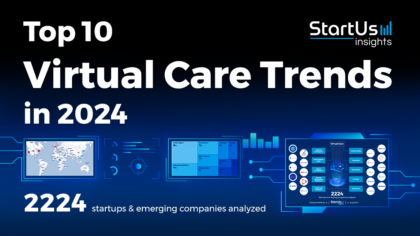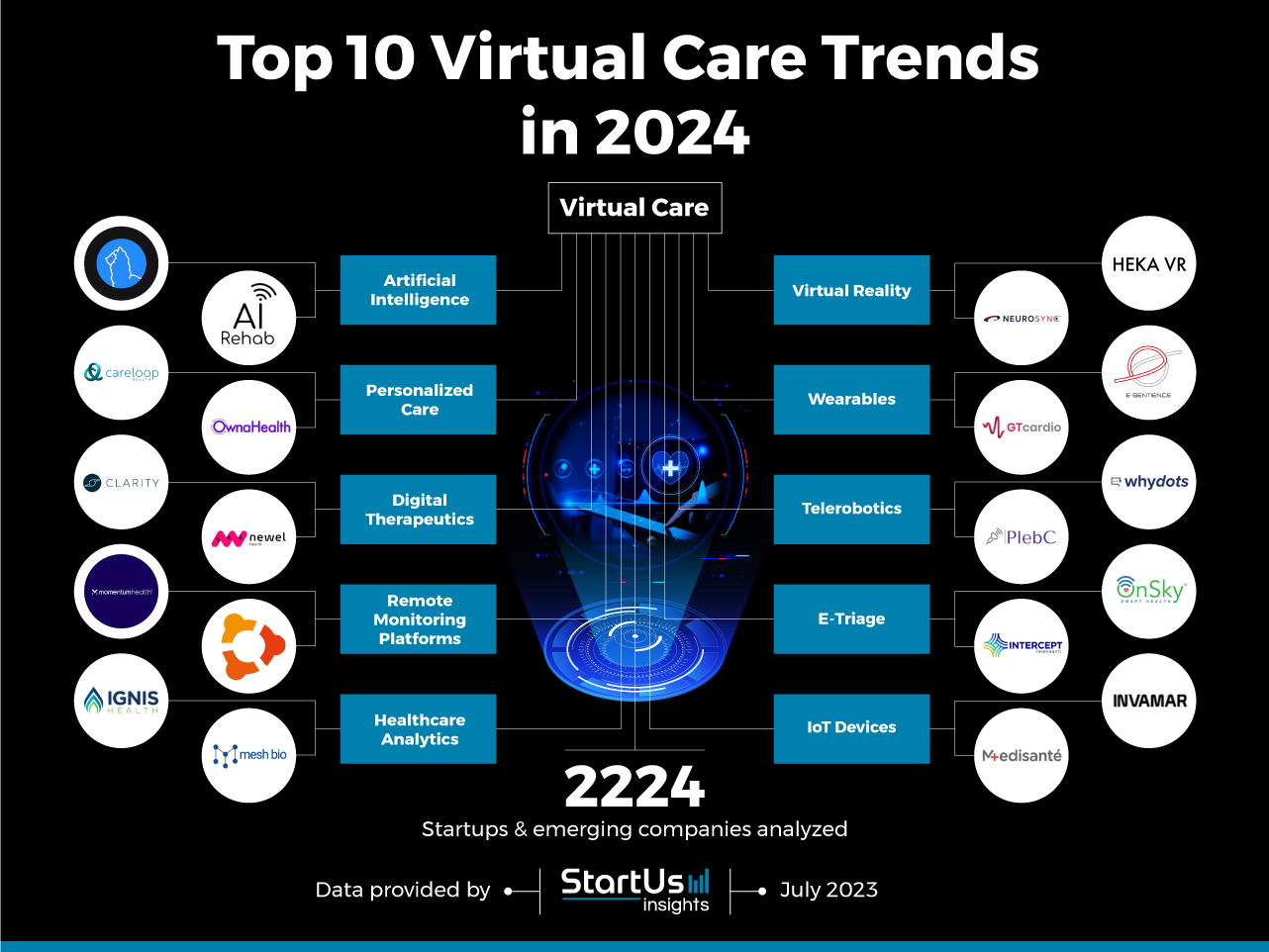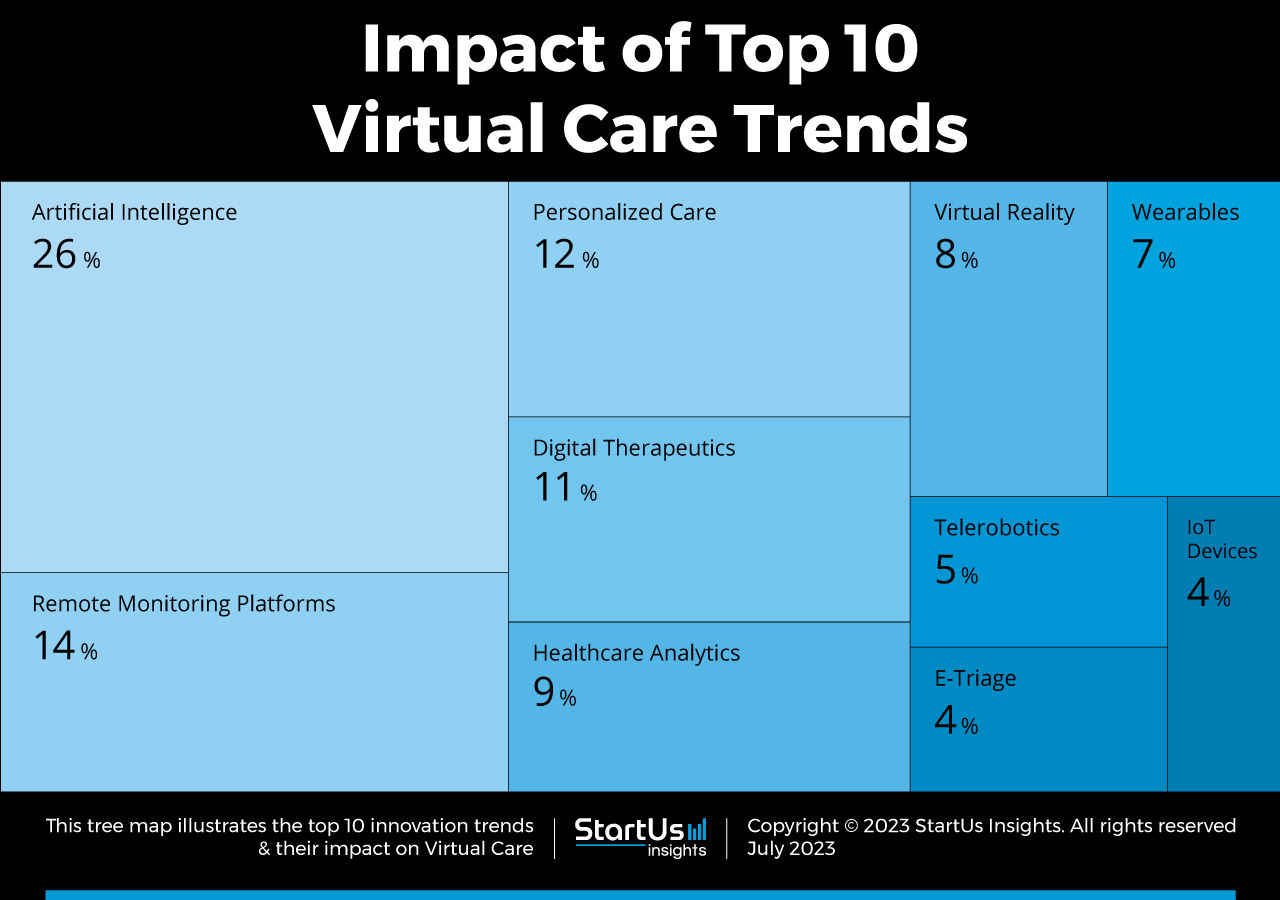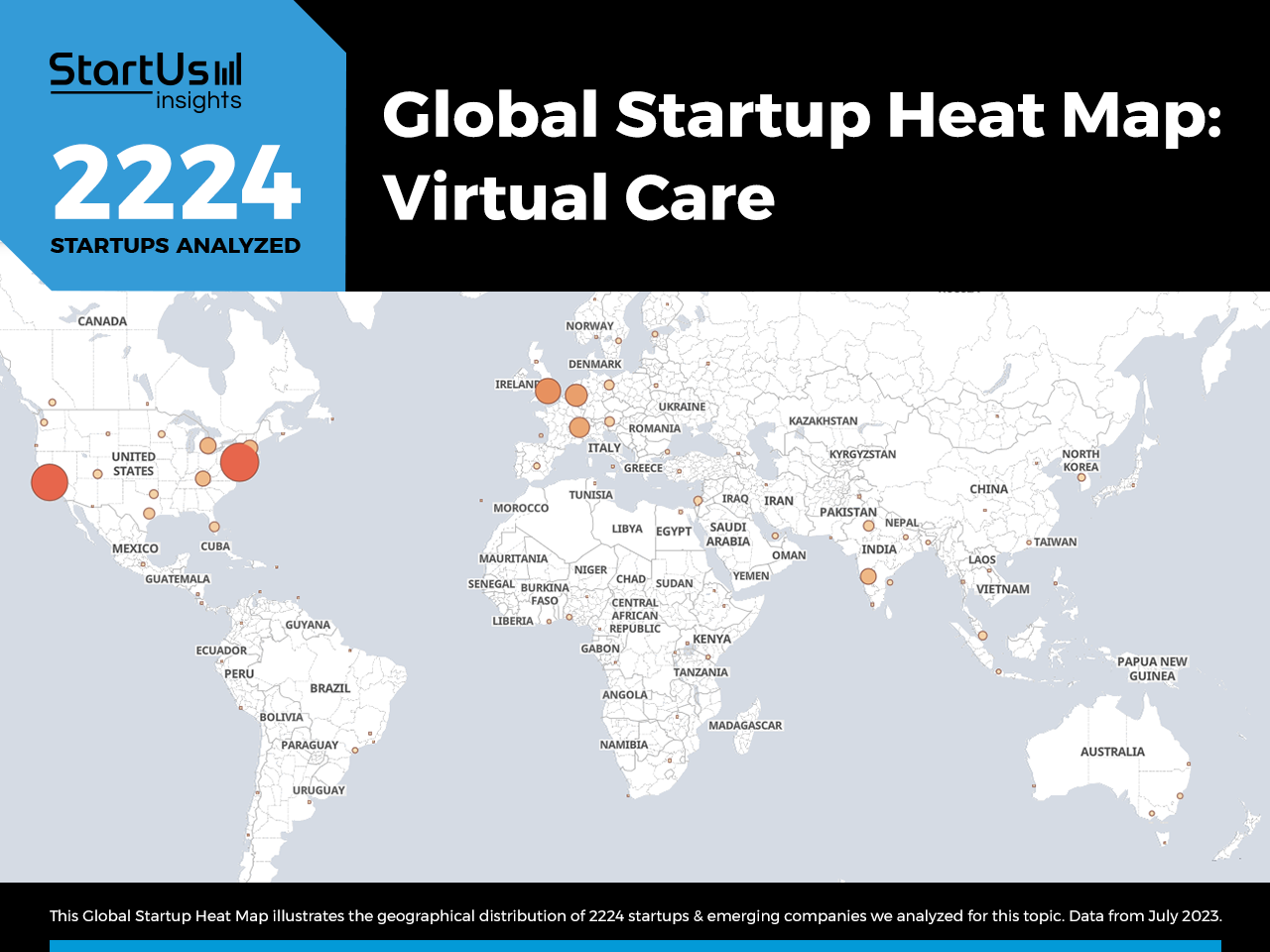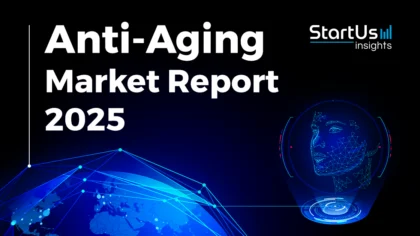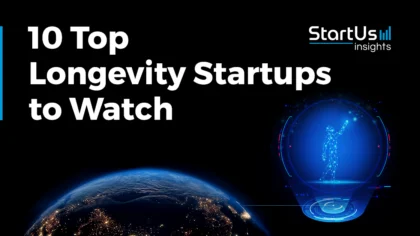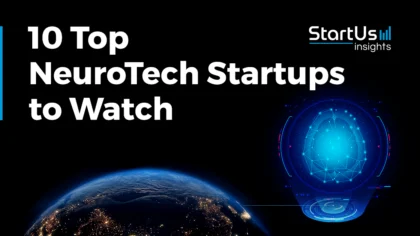Accelerate Productivity in 2025
Reignite Growth Despite the Global Slowdown
Virtual care is a transformative healthcare approach that leverages technology to deliver remote medical services and support to patients. Through virtual care, patients access personalized treatment plans and consultations, regardless of their physical location. Remote care empowers patients in self-management, promoting better engagement and adherence to treatment plans.
That is why the healthcare sector is transitioning to more tech-driven approaches in delivering care to outpatients as well as patients in hospitals. For instance, VR-based therapy e-triage enhances pain management and emergency responses. This research focuses on the top 10 virtual care trends in 2024. Read more to explore all these technologies and how they advance care delivery and patient outcomes.
Top 10 Trends in Virtual Care (2024)
- AI-enahanced Virtual Care
- Remote Patient Monitoring
- Personalized Care
- Digital Therapeutics (DTx) for Virtual Care
- Healthcare Analytics
- VR for Remote Care Delivery
- Wearables
- Telerobotics
- E-Triage
- IoT Devices
Innovation Map outlines the Top 10 Virtual Care Trends & 20 Promising Startups
For this in-depth research on the top remote care trends and startups, we analyzed a sample of 2224 global startups & scaleups. This data-driven research provides innovation intelligence that helps you improve strategic decision-making by giving you an overview of emerging technologies in the healthcare industry. In the Virtual Care Innovation Map below, you get a comprehensive overview of the innovation trends & startups that impact your company.
These insights are derived by working with our Big Data & Artificial Intelligence-powered StartUs Insights Discovery Platform, covering 3 790 000+ startups & scaleups globally. As the world’s largest resource for data on emerging companies, the SaaS platform enables you to identify relevant technologies and industry trends quickly & exhaustively.
Tree Map reveals the Impact of the Top 10 Virtual Care Trends in 2024
Based on the Virtual Care Innovation Map, the Tree Map below illustrates the impact of the Top Virtual Care Trends in 2024. Startups and scaleups are developing solutions for personalized care, digital therapeutics, remote monitoring, healthcare analytics, and triaging. Personalized care tailors treatments to individual needs while digital therapeutics offer evidence-based interventions. Additionally, remote monitoring improves chronic disease management and healthcare analytics transforms data into insights.
AI revolutionizes care with predictive analytics and chatbots. Virtual reality aids in therapy and medical training while wearables enable continuous health monitoring. Telerobotics also enhances remote care and surgeries and IoT devices connect patients and providers to enable proactive health management. These innovations advance virtual care and foster patient-centric healthcare.
Global Startup Heat Map covers 2224 Virtual Care Startups & Scaleups
The Global Startup Heat Map below highlights the global distribution of the 2224 exemplary startups & scaleups that we analyzed for this research. Created through the StartUs Insights Discovery Platform, the Heat Map reveals high startup activity in the US, followed by the UK and Europe.
Below, you get to meet 20 out of these 2224 promising startups & scaleups as well as the solutions they develop. These remote healthcare startups are hand-picked based on criteria such as founding year, location, funding raised, & more. Depending on your specific needs, your top picks might look entirely different.
1. AI-enahanced Virtual Care
Machine learning and AI models help physicians diagnose diseases, interpret medical images, and predict health trends. Natural language processing (NLP) facilitates seamless patient-provider communication as it enables chatbots to offer round-the-clock and accurate patient support. AI-powered platforms also allow remote monitoring, as well as send alerts for deteriorating health conditions.
Other healthcare companies leverage AI to customize health plans and integrate AI into wearable and IoT devices. This enables real-time health data collection and tailored data analysis for personalized medicine.
Additionally, AI-driven virtual reality therapies improve mental health treatment outcomes by delivering immersive and personalized experiences. The industry further leverages cloud-powered AI for scalable, cost-effective solutions. AI thus bridges physical distance, democratizes healthcare, and redefines patient experience for virtual care.
Alpaca Health develops a Long COVID Management App
US-based startup Alpaca Health offers a multimodal AI and automation platform for virtual care. Its Alpaca Connect feature optimizes communication between healthcare teams and patients, reinforcing the continuity of care. The company’s AI platform provides remote care plans for diseases including long-COVID.
The app also features modules to monitor and track symptoms as well as consult with physicians. Alpaca Health’s technology enhances continuous care and clinical outcomes. The platform is particularly beneficial for geriatric and chronic care patients, offering them a way to take control of their health.
ai Rehab promotes Remote Physiotherapy
UK-based startup ai Rehab leverages artificial intelligence for remote physical therapy. The startup’s product Slider has sensors that track the movements and the proprietary AI measures and analyzes the patterns. This benefits patients with musculoskeletal and neurological conditions as well as measures compliance and progress.
The startup improves patient outcomes, saves time, and enhances patient workflows. The company’s platform also offers a range of exercises tailored to individual patient needs, making it a comprehensive solution for remote physical therapy.
2. Remote Patient Monitoring
Remote monitoring platforms facilitate virtual monitoring of patient’s health conditions. They collect essential health data and enable timely interventions. These platforms leverage various medical devices to enable continuous monitoring of patients, particularly those with chronic conditions or post-acute care needs. Continuous monitoring is especially beneficial for patients with chronic conditions like diabetes, heart disease, or hypertension.
By closely tracking patient data, healthcare professionals identify potential issues early on, improving patient outcomes and reducing hospital readmissions. Through video or audio appointments, patients discuss their health concerns, ask questions, and receive medical advice from the comfort of their homes. This improves healthcare accessibility, especially for patients in remote areas, and also minimizes the risk of exposure to contagious diseases.
Momentum Health aids Medical Image Visualization
Canadian startup Momentum Health offers a mobile app for remote scoliosis management. The startup’s app, Momentum Spine, generates an accurate 3D model of the patient’s body and tracks changes in their spinal curvature over time. This technology empowers patients, families, and care teams to monitor scoliosis progression from home, reducing the need for repetitive X-rays.
Momentum Spine also enables early detection of curve progression. It is easy to use, requiring just a 30-second scan to generate a report of the patient’s spinal measurements. The app also utilizes AI to provide patients with the most effective support based on their specific needs.
ConnectedCare offers a Personal Medical Assistant
Dutch startup ConnectedCare makes a diabetes management platform. The startup’s platform, Lizz, is a virtual assistant that helps patients manage their diabetes by providing personalized advice and reminders. It offers reminders, coaching, self-reporting, and access to background information for patients.
Healthcare professionals remotely monitor patients, set goals and reminders, and schedule additional contact moments if necessary. Lizz functions as an extension of healthcare professionals and serves as a “digital aid-in-house” for daily support and guidance during treatment trajectories. The assistant also integrates with other health devices and apps to track their blood sugar levels, physical activity, and diet in one place.
3. Personalized Care
Personalized care is tailored to cater to each patient’s unique characteristics, medical history, and preferences. Using digital technologies, healthcare providers collect and analyze patient data, including health records, lifestyle habits, and genetic information. This data-driven approach enables healthcare professionals to design individualized treatment plans and interventions, optimizing the effectiveness of care.
Such platforms also allow patients to access virtual consultations, receive personalized health recommendations, and engage in remote monitoring. With real-time data tracking and communication, providers stay connected with patients and are able to make timely adjustments to their care plans as needed. This personalized approach fosters a strong patient-provider relationship, empowering individuals to take an active role in managing their health.
Careloop Health delivers Individual Clinical Insights
UK-based startup Careloop Health provides predictive and personalized care for individuals with severe mental illness. The startup utilizes digital therapeutics to predict, manage, and prevent acute mental health events. CareLoop Health’s platform, powered by proprietary AI, recognizes fluctuations in an individual’s mental health and predicts acute events for early intervention. This prevents escalation or relapse and eliminates crises in mental health.
OwnaHealth provides Tailored Lifestyle Management Plans
US-based startup OwnaHealth collaborates with the patient’s primary care physician to address the underlying causes of these conditions. The startup’s OwnaWay is a physician-supervised lifestyle management program. It is supervised by experienced specialist doctors who provide personalized guidance and medical oversight.
OwnaHealth’s comprehensive support includes personalized dietary guidance, exercise, stress management, and behavior modification to suit the unique situation of each patient. The startup’s approach, continuous monitoring, and tailored guidance result in significant health improvements for patients.
4. Digital Therapeutics for Virtual Care
DTx enables patients to access healthcare services remotely from the comfort of their homes. Patients use DTx solutions through smartphones, tablets, or computers, eliminating the need for in-person visits to healthcare facilities. This is particularly beneficial for individuals living in rural or remote areas with limited access to healthcare services.
Its evidence-based interventions are delivered through software applications, devices, or platforms that help prevent, manage, or treat various medical conditions. These interventions are used independently or in conjunction with traditional medical treatments. Digital therapeutics address various health conditions, including chronic diseases, mental health issues, and substance abuse.
Clarity provides an Immersive Sensory Therapy
US-based startup Clarity delivers telemedicine solutions. The startup’s Clarity Telemed is a telemedicine platform that enables healthcare providers to offer virtual care to their patients. The startup’s immersive sensory stimulation device, designed for Alzheimer’s patients, uses light and sound therapies to slow disease progression.
The device pairs with a digital clinic, providing access to healthcare experts, personalized medical guidance, and remote monitoring. This combination enhances the patient’s experience throughout their disease journey. The platform also features video consultations, appointment scheduling, and electronic medical records (EMRs), making it a versatile tool for modern healthcare delivery.
Newel Health facilitates Chronic Care Rehabilitation
Italian startup Newel Health is a digital health company that develops a platform, Newel, to support individuals with chronic conditions. It provides personalized care plans and health coaching to help patients manage their conditions and improve their health. The startup’s other product, Amicomed, is a hypertension control app that provides virtual personalized lifestyle modification programs and remote patient monitoring.
The startup’s Soturi is a digital platform for patients with Parkinson’s Disease, offering physical rehabilitation, speech therapy, and anxiety support virtually. The platform is used in conjunction with wearable devices, which monitor the wearers’ health data and provide real-time feedback.
5. Healthcare Analytics
Healthcare analytics solutions leverage data analysis and statistical techniques to gain valuable insights and make informed decisions within the virtual care spectrum. By analyzing electronic medical records, healthcare providers anticipate disease progression, identify high-risk patients, and optimize treatment plans. In virtual healthcare settings, this predictive capability allows for proactive intervention and complication prevention among remote patients.
Healthcare analytics supports the assessment of telehealth adoption and effectiveness. Through the analysis of patient satisfaction surveys, feedback, and utilization rates, healthcare providers continually improve their healthcare offerings. This enables them to align services with patient preferences and requirements.
Ignis Health ensures Streamlined Telehealth Workflows
US-based startup Ignis Health provides a telehealth management and healthcare analytics software solution. The platform, TSIM, offers a telehealth-specific framework for setting up healthcare programs. It enables healthcare-specific project management and analytics solutions, ensuring process efficiency.
Ignis Health’s solution streamlines and standardizes workflows, enabling quick and efficient service creation and completion. This allows healthcare organizations to achieve project milestones quickly when setting up telehealth programs.
Mesh Bio offers Personalized Clinical Risk Predictions
Singaporean startup Mesh Bio leverages systems biology and predictive analytics to transform patient care. The startup’s health intelligence platform, DARA, delivers clinical decision support and intervention guidance, facilitating remote care delivery. The platform is grounded in evidence-based clinical guidelines and best practices, ensuring the quality of care is not compromised in the virtual setting.
It enhances patient engagement by providing personalized disease risk and adverse event predictions. Mesh Bio’s solution transforms health screening and chronic disease management, guiding pharmaceutical development by revealing pharmacodynamics in complex biological processes.

6. VR for Remote Care Delivery
VR enables immersive therapy and remote consultations with healthcare professionals, eliminating the need for physical visits. It proves valuable in pain management and rehabilitation. By immersing patients in captivating virtual environments, VR distracts them from physical discomfort during medical procedures or post-operative recovery. This contributes to reduced reliance on pain medication and faster healing, improving patient outcomes.
Virtual reality enhances patient education and understanding of health conditions. Complex medical concepts are simplified through interactive visualizations, This empowers patients to make informed decisions about their treatment options and actively participate in their healthcare plans. VR therapy further offers personalized and private environments for addressing anxiety, phobias, and post-traumatic stress disorder (PTSD), improving emotional healing.
NeuroSync advances Neurological Patient Monitoring
US-based startup NeuroSync develops a platform that aids neurological patient monitoring. The startup’s wireless virtual reality-based platform, EYE-SYNC, offers fast, accurate, and reliable brain health diagnostics and therapies. Its proprietary algorithms and quantification methods are validated by the FDA, enhancing the level of clinical sensitivity.
The platform is a remote managing tool for healthcare providers and patients to monitor required parameters. NeuroSync thus improves patient care by providing actionable data to identify deficits, monitor drug responses, initiate training, and more.
Heka VR delivers Avatar Therapy
Danish startup Heka VR makes AR-based software for mental health treatment. The startup’s product facilitates psychological treatment for patients suffering from schizophrenia with auditory hallucinations. The platform enables physicians to conduct avatar therapy, a form of psychotherapy, in virtual environments, providing exposure to challenging situations in a controlled, flexible, and immersive setting.
The platform includes a face creation module for creating a visual representation of the patient’s malevolent voice. Its voice module also changes the therapist’s voice to resemble the patient’s persecutory voice. Additionally, the platform features real-time VR simulation for engaging in dialogue with visual representation.
7. Wearables
Wearables enable continuous health tracking, facilitating real-time data collection and analysis. Patients share vital signs, activity levels, and other health metrics with healthcare professionals, allowing them to assess their condition without physical consultations. Wearables promote early detection and prevention of health issues. By constantly monitoring patients, these devices identify potential problems or abnormalities before they escalate. This ensures timely intervention and better health outcomes.
Wearables also play a vital role in remote disease management of chronic conditions. Patients with conditions like diabetes or hypertension monitor their health status and share the data with healthcare professionals. This simplifies remote management and reduces the need for frequent hospital visits. By remotely monitoring patients and intervening proactively, healthcare facilities prevent unwanted hospitalizations or complications, leading to overall cost savings.
GTcardio facilitates Continuous Patient Monitoring
US-based startup GTcardio offers advanced technologies for remote cardiac, respiratory, and sleep monitoring. The startup’s CALM platform is integrated into wearables and provides continuous, non-invasive hemodynamic monitoring. The platform detects early stages of cardiovascular diseases and neurodegenerative diseases, such as Alzheimer’s.
CALM platform also enables medical staff to develop tailored therapies for seniors in assisted living facilities, improving the quality of care and reducing staffing requirements. GTcardio’s innovative approach to health monitoring and disease prevention advances personalized medicine and the management of chronic conditions.
E-SENTIENCE provides a Wearable Sweat Sensor
US-based startup E-SENTIENCE builds a wearable device for real-time stress monitoring. The startup’s Sentient Skin is a non-invasive cortisol sweat sensor that measures stress levels directly and accurately. The wearable also provides cooling relief to lower stress levels during critical moments.
Sentient Skin is designed as a comfortable arm sleeve, optimized for physical activity, and does not require a charger, making it suitable for 24/7 wear. The device’s user-friendly interface is compatible with smartphones and smartwatches. It provides accurate measurements, alerts, warnings, and data collection for healthcare analytics.
8. Telerobotics
Telerobotic systems allow remote control of robotic devices. This allows healthcare professionals to perform intricate medical procedures and offer expert care to patients from a distance. Surgeons conduct surgeries using robotic arms, ensuring precision and reducing the need for physical presence.
Telerobotics thus aids in disaster response and areas without access to medical assistance and assessment. Startups use advanced robotics and haptic feedback to further recreate the sense of touch for precise manipulation. Telerobotics enhances virtual care by expanding healthcare access and ensuring efficient healthcare delivery across geographical boundaries.
PlebC Innovations works on a Telerobotic Ultrasound System
Indian startup PlebC Innovations makes a telerobotic ultrasound system to facilitate teleradiology. It allows radiologists to operate and perform ultrasounds for multiple centers, serving more patients without changing location. This makes ultrasound imaging more accessible, regardless of geographical location, while removing the need for full-time radiologists
WhyDots develops Robots for Mental health Care
South Korean startup WhyDots utilizes robot technology to support families dealing with dementia and developmental disorders. The startup’s robot, PIO, provides dementia prevention content in various areas such as exercise, art, music, cognition, and emotion.
The startup’s other robot, Momo, utilizes Clova AI’s NAVER CLOVA technology and offers emotional understanding education content. It supports various gestures and a friendly voice, facilitating the learning of emotional expression. These robots provide interactive therapy assistance and engaging ways to manage and mitigate the effects of cognitive disorders.
9. E-Triage
E-triage allows patients to receive initial assessments and urgent care advice without traveling long distances. It also streamlines remote patient evaluation, identifying critical cases promptly and optimizing resource allocation for timely care. E-Triage platforms provide rapid and decisive interventions remotely to patients facing life-threatening situations.
E-Triage in remote healthcare ensures timely referrals to specialized care when necessary. Healthcare providers thus promptly identify cases requiring specialized expertise and collaborate with other specialists to ensure comprehensive and coordinated patient care. This enables efficient assessments, resource optimization, timely interventions, and improved accessibility to healthcare services, enhancing patient outcomes.
Intercept Telehealth builds a Tele-ICU System
US-based startup Intercept Telehealth offers a comprehensive solution for virtual critical care. The startup’s tele-ICU system integrates with existing hospital infrastructure and provides real-time patient support across all specialty areas. The system enhances operational efficiency, eliminates bottlenecks, and facilitates speedier triage and patient flow.
The system’s technology stack includes predictive analytics and data visualization to enable evidence-based, proactive patient care. Intercept Telehealth’s system thus improves patient outcomes, enhances the efficiency of clinicians, and maximizes EMR documentation.
OnSky Health International facilitates Critical Medical Event Detection
US-based startup OnSky Health International offers SkyPad, a non-invasive health monitoring device. It proprietary contactless health sensor technology, AI, and machine learning to continuously monitor sleep without any skin contact. The device monitors heart rate, breathing rate, sleep patterns, estimated body temperature, body movement, and snoring as well as room temperature and humidity.
SkyPad also features an SOS assistance and bed-leaving alert for falling prevention. OnSky Health offers an optional subscription service – urgency detection and alert service (UDAS). Its product and service enhance safety by offering continuous monitoring and detection of non-medical urgent conditions. They are useful for various care settings including elderly care, home care, nursing homes, hospice, and palliative care.
10. IoT Devices
IoT interconnects devices and sensors to a network to enable real-time patient data collection, also enabling remote health monitoring. Wearables, smart home devices, and medical equipment offer continuous tracking and early detection of health issues. AI-driven analytics further process this data to provide personalized health insights and treatment recommendations.
Additionally, virtual consultations empower seamless data exchange between patients and healthcare providers. IoT enhances medication adherence by sending reminders and tracking dosages. AI-powered wearables track vital signs and analyze patterns to predict potential health risks. Healthcare professionals utilize AI-driven analytics to identify population health trends and design targeted interventions for improved public health outcomes.
Medisante Group provides Medical IoT Data-as-a-Service
Swiss startup Medisante Group offers medical IoT data-as-a-service. The startup’s product, M+ Hub, integrates into virtual care platforms, eliminating the need for consumer smartphones and proprietary clouds of device vendors. It also provides remote device monitoring across vendor, platform, and country silos, tracking the devices’ health to make it cost-efficient.
M+ Hub supports device interoperability and multi-vendor remote device monitoring (RDM) for devices connected to the cloud. Medisante Group’s solution allows healthcare providers to manage their patient’s health data more effectively.
Invamar designs IoT-powered Wearable Devices
Turkish startup Invamar makes IoT-powered wearables to enhance patient health and well-being. The startup’s MeSenseU is a smart textile-based wearable that helps individuals with communication difficulties caused by disorders. Invamar’s Fabenode is an on-skin data collector textile electrode with a conductive surface that captures data parameters invasively from the skin surface.
Fabenode enables passive and real-time monitoring of vital signs like ECG, EEG, and more. The startup allows healthcare facilities to identify, track, and monitor bio-behavioral states with the wearables, and leverage neural networks and IoT-based software to analyze and predict illness.
Discover all Virtual Care Trends, Technologies & Startups
Advanced machine learning algorithms are redefining disease diagnosis and enabling personalized treatments. The emergence of telemedicine platforms, wearable devices, and remote monitoring systems offers continuous health tracking and timely interventions. Further, the exploration of nanotechnology and genomics opens new possibilities for precision medicine and targeted therapies. As startups embrace cloud computing for scalable solutions and blockchain for enhanced data security, virtual care democratizes healthcare access.
The virtual care innovations and startups outlined in this report only scratch the surface of trends that we identified during our data-driven innovation & startup scouting process. Identifying new opportunities & emerging technologies to implement into your business goes a long way in gaining a competitive advantage.
